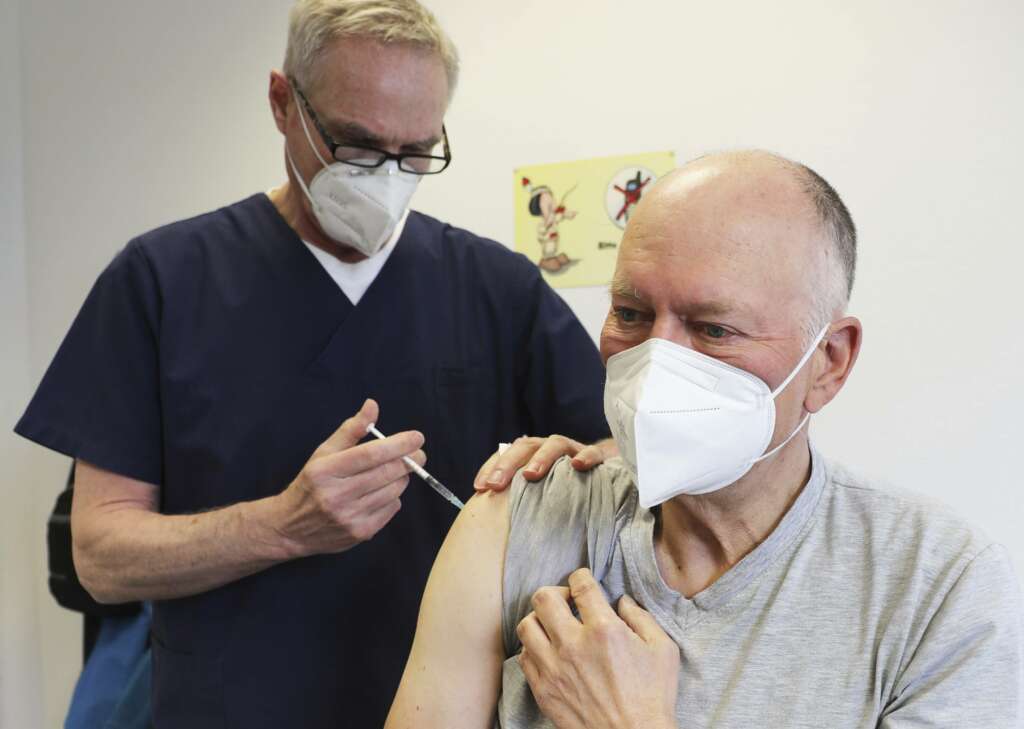
ROME (AP) — A top official at the European Medicines Agency says there’s a causal link between AstraZeneca’s coronavirus vaccine and rare blood clots, but that it’s unclear what the connection is and that the benefits of taking the shot still outweigh the risks of getting COVID-19.
Marco Cavaleri, head of health threats and vaccine strategy at the Amsterdam-based agency, told Rome’s Il Messaggero newspaper on Tuesday that the European Union’s medicines regulator is preparing to make a more definitive statement on the topic this week.
Asked about Cavaleri’s comments, the EMA press office said its evaluation “has not yet reached a conclusion and the review is currently ongoing.” It said it planned a press conference as soon as the review is finalized, possibly Wednesday or Thursday.
Based on the evidence so far, Cavaleri said there’s a clear association between the AstraZeneca vaccine and the dozens of rare blood clots that have been reported worldwide amid the tens of millions of AstraZeneca shots that have been given out.
“It is becoming more and more difficult to affirm that there isn’t a cause-and-effect relationship between AstraZeneca vaccines and the very rare cases of blood clots associated with a low level of platelets,” Cavaleri was quoted as saying.
AstraZeneca did not immediately respond to a request for comment. Late in the day, however, the pharmaceutical company and Oxford University, which developed the vaccine, announced they were pausing the trial of their jabs in children while British regulators investigate the potential blood clot link in adults.
“Whilst there are no safety concerns in the pediatric clinical trial, we await additional information” from the British regulator, an Oxford spokesperson said in a statement.
In Geneva, the World Health Organization said its experts were also evaluating a possible link between the AstraZeneca vaccine and rare blood clots — and that it might have a “fresh, conclusive assessment” before Thursday.
In March, more than a dozen countries, including Germany, suspended using AstraZeneca over the blood clot issue. Most EU nations restarted on March 19 — some with age restrictions — after the EMA said the benefits of the vaccine outweighed the risks of not inoculating people against COVID-19. At the time, the EMA recommended the vaccine’s leaflet be updated with information about the rare clots.
Any further doubts about the AstraZeneca vaccine would be a setback for the shot, which is critical to Europe’s immunization campaign and a linchpin in the global strategy to get vaccines to poorer countries. The AstraZeneca vaccine is cheaper and easier to use than rival vaccines from Pfizer and Moderna and has been endorsed for use in over 50 countries, including by the 27-nation EU and the World Health Organization. U.S. authorities are still evaluating the vaccine.
Cavaleri said while EMA was prepared to declare a link, further study was still needed to understand why and how the phenomenon occurs.
He said the rare blood clots, including some in the brain, coupled with a low level of blood platelets that may make people at risk of serious bleeding, “seem to be the key event to study further.” Cavaleri promised more details soon, adding: “In the coming hours, we will say that the link is there, how this happens we still haven’t figured out.”
Cavaleri said the biological mechanism for how the vaccine might be causing the rare clots was still unknown and if it was linked to how the shot is made, other vaccines with similar technologies might also need to be evaluated.
He stressed the risk-benefit analysis remained positive for the AstraZeneca jab, even for young women who appear to be more affected by the clots.
“Let’s not forget that young women also end up in intensive care with COVID. So we need to do very meticulous work to understand if the risk-benefit analysis remains for all ages,” he was quoted as saying.
He ruled out a preventive therapy to address the rare blood clots, saying there is still too much unknown about the phenomenon.
Even after the March 19 restart, the Dutch and German governments suspended the jabs for people under 60 and some Europeans have been shying away from getting a shot.
Romania’s national vaccination committee’s chief, Valeriu Gheorghita, said Tuesday that since March, 207,000 people in Romania had canceled their AstraZeneca vaccine appointments and another 92,000 simply didn’t show up.
“It is a high percentage, a third of people scheduled who did not show up,” Gheorghita told reporters.
British Prime Minister Boris Johnson declined to be drawn directly into the latest warnings about the vaccine but urged people to look at the advice from Britain’s independent Medicines and Healthcare Regulatory Agency.
“Their advice to people is to keep going out there, get your jab, get your second jab,” he said during a visit Tuesday to an AstraZeneca facility in Macclesfield, in northwest England.
Last week, Britain’s MHRA said seven people had died in the U.K. due to blood clots after getting the AstraZeneca jab. It said it wasn’t clear if the shots are causing the clot and that it was undertaking a “rigorous review” into the reports. The agency said it had identified 30 blood clot cases out of 18.1 million AstraZeneca jabs given by March 24.
Adam Finn, a professor of pediatrics at the University of Bristol, said the latest surge of COVID-19 cases that is filling up hospitals across Europe should prompt people to get vaccinated as soon as possible.
“If you are currently being offered a dose of Oxford-AstraZeneca vaccine, your chances of remaining alive and well will go up if you take the vaccine and will go down if you don’t,” he said.
___
Pylas reported from London. Maria Cheng and Danica Kirka contributed from London.
___
Follow AP’s pandemic coverage at https://apnews.com/hub/coronavirus-pandemic and https://apnews.com/hub/coronavirus-vaccine
Copyright © 2021 . All rights reserved. This website is not intended for users located within the European Economic Area.
